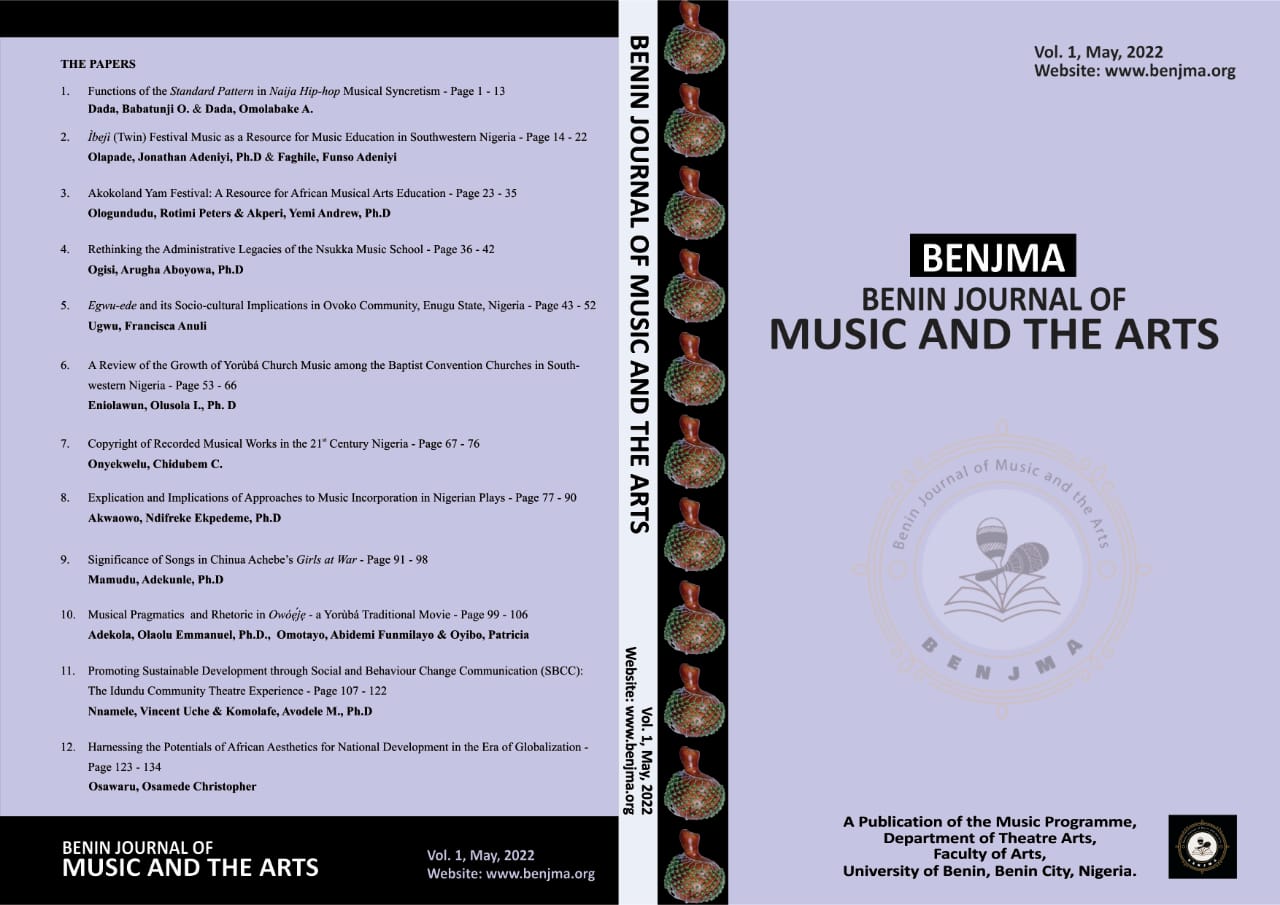
Editorial Note
Editorial Note
The Benin Journal of Music and the Arts (BENJMA), which was established in 2021, is a publication of the Music Programme of the Department of Theatre Arts, Faculty of Arts, University of Benin, Benin City, Nigeria. BENJMA operates an open access policy of internet publication to facilitate easy accessibility and wide readership, and also produces complimentary print versions to meet the desire of readers who would want to obtain hard copies as alternative
and/or supplementary acquisitions. BENJMA is designed to publish at least one (1) Issue yearly, and to undertake the publication of Special Issues from time to time when the need arises.
BENJMA receives and publishes well-researched scholarly articles in music and the arts to promote scholarship and support the dissemination of research findings at local and global levels. It provides the forum for discourses on the historical, contemporary, and evolving subject matters that would serve as bases for the formation of future perspectives, the making of impactful predictions, and the galvanisation of developmental ideas.This present publication, Volume 1, is the maiden edition of BENJMA published in May 2022. This volume is a kaleidoscope of articles on music and the arts, featuring twelve (12) articles from a range of thematic areas such as musical syncretism, traditional festival, music education, music administration, church music, music copyright, music in drama, music in literature, music in movie, theatre for development (tfd), and aesthetics. Readers would most assuredly find the articles interesting, informative, educative, and thought-provoking.
Volume 1 , May 2022
This study investigates the intersection between Efik music and traditional embroidery practices among artisans in Calabar, Cross River State, Nigeria. Drawing from both ethnographic fieldwork and interpretive procedures, the study explores the ways that rhythmic patterns, musical paraphernalia, practices, expressions, and artistic components inherent in Efik music influence visual and tactile expressions in embroidery.
The Nigerian theatre scene is experiencing a significant transformation through the integration of digital technologies. This paper critically examines the implications, persistent obstacles, and potential pathways for this digital shift within Nigerian theatrical productions.
This study explored how Nollywood’s value-oriented narratives are reconfigured and interpreted in the age of digital streaming. Focusing on a purposive sample of eight films released between 2020 and 2024 on platforms such as Netflix and iROKOtv, the research examined how moral storytelling was shaped by platform mediation and how it was received by audiences within Nigeria and across the diaspora.
This study interrogates the maxim that “it is easier to play the devil than to play god.” It particularly examines the dramaturgical challenges inherent in portraying morally-ideal or divine figures (colloquially termed “playing god”) in Nigerian theatre. The research focuses on selected Nigerian plays, which were purposively chosen and qualitatively reviewed.
Yoruba songs serve as vital cultural tools for identity, communication, instruction, and spirituality. This paper explores the functional significance of Yoruba songs within the initiation rites of Theatre Arts students at the Federal College of Education (FCE), Abeokuta, with specific attention to the 2023 ceremony. The study adopts a qualitative ethnographic approach which involves participant observation and contextual review of songs used at the initiation ceremony.
